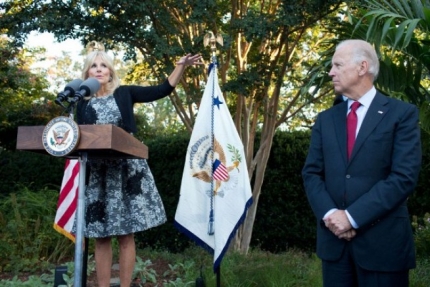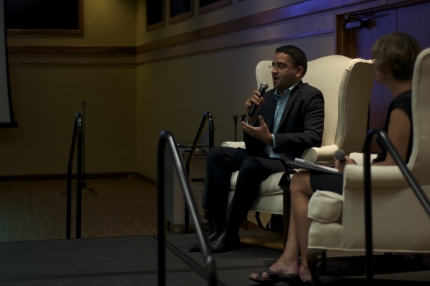Blog Posts Related to the LGBT Community
Going Purple for Spirit Day
Posted by on October 19, 2012 at 10:35 AM EDTSpirit Day -- the celebration to honor and support young people who have been victims of bullying -- is now three years old.
It has become a day when people the world over rally for LGBT community and speak out against the bullying of LGBT teens.
And this year, the White House is once again going purple online. You can check out our Twitter feed or our Facebook page to see how we're marking the day -- and take part by making your social networking icon purple or adding a statement of support.
To learn more about what you can do to support kids and stop bullying, check out stopbullying.gov/.
 Learn more about Civil Rights,
Learn more about Civil Rights,Helping Understand and Treat HIV Through Community-Based Leadership
Posted by on September 27, 2012 at 3:10 PM EDTThe lesbian, gay, bisexual and transgender (LGBT) community have helped bring about much of the tremendous progress in understanding and treating HIV, ranging from increasing HIV awareness, to fighting HIV-related discrimination, to volunteering for cutting-edge research. This legacy of community-based leadership is one to note on this 5th Annual National Gay Men’s HIV/Awareness Day.
In 2010, President Obama released the nation’s first comprehensive National HIV/AIDS Strategy, which called for aligning resources where HIV is most concentrated, and implementing evidence-based, high-impact interventions to reduce new HIV infections, improving HIV-related health outcomes, and reducing HIV-related disparities. The Strategy has focused Federal, State, and local efforts on a combination prevention approach for gay men and other populations at high risk, including increasing HIV testing and HIV treatment, because studies demonstrate that increasing diagnosis rates and reducing viral loads will significantly reduce new HIV infections in disproportionately affected communities.
The National HIV/AIDS Strategy also calls for addressing stigma and discrimination as part of a comprehensive response to the HIV epidemic. In keeping with the goals of the Strategy, the Department of Justice has taken steps to enforce civil rights laws that protect the rights of persons living with HIV/AIDS, and has launched a website dedicated to fighting discrimination against people living with HIV/AIDS.
Learn more about Additional IssuesCelebrating the Next Generation of LGBT Leaders
Posted by on September 21, 2012 at 10:48 AM EDTOn Wednesday, the Vice President and Dr. Biden hosted an “End of Summer BBQ” at the Vice President’s Residence with emerging young leaders of the lesbian, gay, bisexual, and transgender (LGBT) community. They were joined by senior Obama Administration officials, leaders of national LGBT organizations, and campus and community leaders from all over the country.
Guests at the event represented tremendous diversity and talent within the LGBT community. They included students and community organizers, advocates and artists, and veterans – all committed to the pursuit of equality, justice, and dignity for LGBT people.
Learn more about Civil RightsMarking One Year Since the Repeal of Don’t Ask, Don’t Tell
Posted by on September 20, 2012 at 6:04 PM EDTEarlier today, I had the opportunity to meet with a small group of openly gay and lesbian servicemembers, together with several of their partners and spouses. We celebrated the one year anniversary of the repeal of “Don’t Ask, Don’t Tell.”
The servicemembers represented a range of ranks and services. All of them agreed that the most remarkable aspect about their post-repeal service is that, after just one year, serving in the military without DADT feels unremarkable because the transition has been so smooth.
It should come as no surprise to any of us that the men and women of our armed forces have handled the repeal of DADT with the professionalism and class that we have come to expect from the finest fighting force in the world. As a consequence, our national security has been strengthened.
As the President said in a statement issued today, “Gay and lesbian Americans now no longer need to hide who they love in order to serve the country they love. It is a testament to the professionalism of our men and women in uniform that this change was implemented in an orderly manner, preserving unit cohesion, recruitment, retention and military effectiveness.”
Learn more about Civil Rights, DefenseFrom the Archives: The End of Don't Ask, Don't Tell
Posted by on September 20, 2012 at 1:30 PM EDTOn this day in 2011, “Don’t Ask, Don’t Tell” was finally and formally repealed, allowing gay and lesbian service members to serve openly in our nation’s armed forces.
In a statement marking the anniversary, President Obama said that repealing the law "upheld the fundamental American values of fairness and equality."
"The ability of service members to be open and honest about their families and the people they love honors the integrity of the individuals who serve, strengthens the institutions they serve,” he continued, “and is one of the many reasons why our military remains the finest in the world."
President Obama signed repeal into law in December of 2010, and in July of 2011 the President, the Secretary of Defense, and the Chairman of the Joint Chiefs of Staff certified that the Department of Defense had taken all the steps needed to prepare the military for repeal. Sixty days after that, at 12:01 a.m. on September 20, 2011, the era of Don’t Ask, Don’t Tell was over.
Learn more about Civil Rights, DefenseOn the Road in Murray, Kentucky: Empowering & Supporting LGBT Students
Posted by on September 18, 2012 at 6:19 PM EDTPresident Obama has often said that the best ideas don’t just come from Washington. They come from individuals and communities all across the country. That’s why we – the Office of Public Engagement – are always looking for opportunities to engage the American public in communities all across America.
Earlier this month, I had the chance to visit Murray State University in Western Kentucky for a series of events focused on the LGBT community. Murray is a proud institution that has taken important steps to create an inclusive, respectful, and safe environment for LGBT students, staff, and faculty, as well as members of the broader Murray community. Recently, Murray State has implemented a number of best practices – from hiring an LGBT program coordinator to support the student population to establishing a “Safe Zone” program to ensure that all students are safe to learn and thrive – and they are already seeing the positive results.
While on campus, I was honored to meet with the President and Provost of Murray State University to hear about their ongoing efforts and thank them for their leadership. I also participated in an evening conversation where I had the opportunity to share some of the important steps President Obama and his Administration have taken over the last few years to ensure equality, dignity, and justice for LGBT people. We were joined by students, faculty, and members of the community, as well as several individuals from nearby communities who were eager to talk about their own experiences and learn more about the Obama Administration’s efforts to support the LGBT community.
Throughout my visit, I was inspired by the important work taking place at Murray State to create a truly inclusive environment for all members of the community. This kind of work is taking place all across the country – in big towns and small towns, in urban and rural regions – and we can all learn from it.
Gautam Raghavan is an Associate Director in the White House Office of Public Engagement.
National HIV/AIDS and Aging Awareness Day: Recognizing the Challenges of Growing Older with HIV/AIDS
Posted by on September 18, 2012 at 2:29 PM EDTToday marks the fifth observance of National HIV/AIDS and Aging Awareness Day. It is a day where we recognize that while the progress made in reducing HIV mortality and morbidity is remarkable, people aging with HIV face multiple, unique challenges. By 2015 over half of all people living with HIV in the US will be over age 50. A major reason for the ‘greying’ of HIV in the US is due to the tremendous success of medications that have dramatically increased the lifespans of people living with HIV.
About 10% of new HIV infections in the United States occur among persons over 50. HIV prevention among older adults is complicated because clinicians are less likely to consider the possibility of HIV infection in this population. Part of the reason for this is that the overwhelming majority of new HIV infections in the US occur among younger populations. However, decreased testing rates mean that older adults are more likely than younger adults to be diagnosed later in their disease progression (i.e. more likely to be diagnosed with AIDS less than a year after diagnosis).
Racial and ethnic disparities observed in the US HIV epidemic overall are reflected among older persons living with HIV. The rates of HIV/AIDS among people over 50 are 12 times higher for African-Americans and 5 times higher for Latinos compared with whites, which has implications for life expectancy as well as HIV transmission because black and Latino populations generally are less likely to have access to clinical care.
While more people aging with HIV are living healthier, more productive lives than ever before, growing older with HIV may present multiple medical challenges. Because the immune systems of people living with HIV are constantly fighting infection, they are more prone to ongoing inflammation which is associated with co-morbid conditions associated with aging such as diabetes, heart disease, hypertension, and cancer. Liver disease, often the result of co-infection with hepatitis C, is prevalent. Decreased bone density is also common, potential due to combination of the normal aging process, medication side effects, and the direct effects of the virus itself
Empowering Young People to Build a Kinder, Braver World
Posted by on August 8, 2012 at 9:57 AM EDTYesterday, Cynthia Germanotta and I had the opportunity to discuss how to empower young people and end bullying at the Third Annual Bullying Prevention Summit in Washington, D.C. Cynthia and her daughter, Lady Gaga, recently founded the Born This Way Foundation to empower young people with the skills and opportunities they need to build a kinder, braver world.
As moms, both Cynthia and I realize the impact that bullying—and kindness—can have on young people. We both agreed that we must all stay focused on ending bullying because no young person, or their loved ones, should have to endure the pain, agony, and loss to our families, schools, and communities that can come with bullying.
We also agreed that we need to reinforce positive behavior and motivate everyone, particularly young people, to get engaged.
President Obama believes that together, we can end bullying. The President and his Administration are committed to developing a comprehensive policy, and all of us have a vital role to play: students, parents, and school administrators, as well as political, business, community, and faith leaders.
Learn more about








